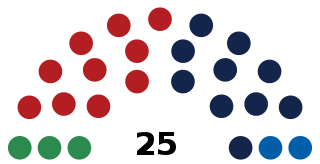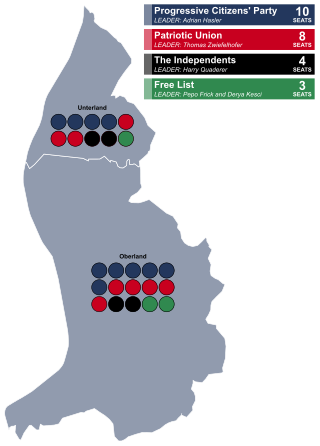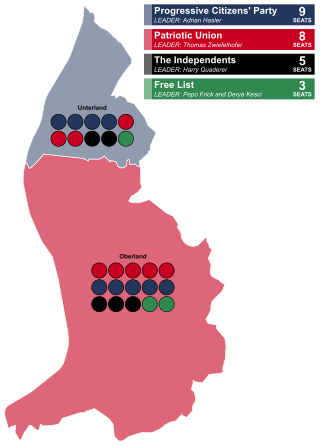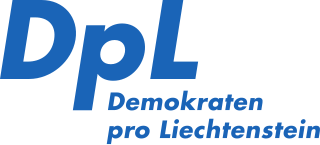
Liechtenstein is a principality governed under a semi-constitutional monarchy. It has a form of mixed constitution in which political power is shared by the monarch and a democratically elected parliament. There is a two-party system and a form of representative democracy in which the prime minister and head of government is responsible to parliament. However the Prince of Liechtenstein is head of state and exercises considerable political powers.

The Progressive Citizens' Party in Liechtenstein is a conservative political party in Liechtenstein. The FBP is one of the two major political parties in Liechtenstein, along with the liberal-conservative Patriotic Union. Founded in 1918 along with the now-defunct Christian-Social People's Party, it is the oldest extant party in Liechtenstein.

The Patriotic Union is a liberal-conservative political party in Liechtenstein. The VU is one of the two major political parties in Liechtenstein, along with the monarchist conservative Progressive Citizens' Party (FBP). The VU is the relatively more liberal of the two parties, advocating constitutional monarchy and greater democracy. It is led by Thomas Zwiefelhofer and has ten members in the Landtag.

The Free List is a political party in Liechtenstein. As of 2023, it has three seats in the Landtag of Liechtenstein and is represented in five of the local councils. It was founded in 1985 and described itself as social-democratic and green.

Elections in Liechtenstein take place at a national level within a multi-party system, with two dominant political parties. The Landtag of Liechtenstein has 25 members, elected for a four-year term by proportional representation in two multi-seat constituencies.
The German National Movement in Liechtenstein was a Nazi party in Liechtenstein that existed between 1938 and 1945.

The Workers' and Peasants' Party was a political party in Liechtenstein. The party emerged from the trade union movement, as no workers had been elected in the 1949 elections. The party was founded as a delegates' assembly in 1953. It contested the February 1953 elections, it received 198 votes (6.9%) and but failed to win a seat due to the 18% electoral threshold. The party did not contest the June 1953 elections, and has not contested any since.

The Landtag of the Principality of Liechtenstein, commonly referred to as the Landtag of Liechtenstein, is the unicameral parliament of Liechtenstein.

Early general elections were held in Liechtenstein on 24 October 1993 following the dissolution of Parliament on 15 September after a vote of no confidence in Prime Minister Markus Büchel initiated by members of his own party, the Progressive Citizens' Party. The result was a victory for the Patriotic Union, which won 13 of the 25 seats in the Landtag. Voter turnout was 85%.

General elections were held in Liechtenstein on 1 and 3 February 1974. The result was a victory for the Progressive Citizens' Party, which won 8 of the 15 seats in the Landtag. Voter turnout was 95.3%, although only male citizens were allowed to vote. This was the last election contested by the Christian Social Party.

General elections were held in Liechtenstein on 31 January and 2 February 1986. The result was a victory for the Patriotic Union, which won 8 of the 15 seats in the Landtag. The Progressive Citizens' Party won seven seats, whilst the new Free List narrowly failed to cross the 8% electoral threshold and did not obtain representation. The coalition government of the FBP and the VU continued.

General elections were held in Liechtenstein on 11 March 1918, with a second round on 18 March. They were the first elections held in the country contested by political parties, as the Christian-Social People's Party and Progressive Citizens' Party had been founded that year. The Progressive Citizens' Party emerged as the largest in the Landtag, winning seven of the 12 elected seats.

General elections were held in Liechtenstein in March 1932. A new electoral system was introduced in which the Landtag was elected in two rounds. In the first round then members were elected, with every municipality with more than 300 inhabitants electing one member. The second round involved the election of the remaining five Landtag members through a national vote with the whole of Liechtenstein serving as one electoral district.

General elections were held in Liechtenstein on 3 February 2013, using a proportional representation system. Four parties contested the elections; the centre-right Patriotic Union (VU) and Progressive Citizens' Party (FBP), centre-left Free List (FL) and newly created populist alliance The Independents (DU).

The Independents is a right-wing populist Eurosceptic political party in Liechtenstein. In the 2013 parliamentary election, the first they contested, they won 29,740 votes (15.3%) and four seats in the Landtag. DU is headed by former Patriotic Union parliamentarian Harry Quaderer.
The Christian-Social People's Party, often shortened to People's Party, was a social liberal political party in Liechtenstein. Founded in 1918, the Christian-Social People's Party and the Progressive Citizens' Party (FBP) were the first political parties in Liechtenstein.

General elections were held in Liechtenstein on 5 February 2017 to elect the 25 members of the Landtag.

General elections were held in Liechtenstein on 7 February 2021 to elect the 25 members of the Landtag. The Patriotic Union (VU) and Progressive Citizens' Party (FBP) both won ten seats, with the VU receiving just 42 votes more than the FBP. The Independents (DU), which finished third in the 2017 elections but then suffered a split in 2018 when three of its five MPs broke away to form Democrats for Liechtenstein (DpL), failed to win a seat, while DpL won two. The Free List retained its three seats, becoming the third-largest party in the Landtag.
Women's suffrage in Liechtenstein was introduced on 1 July 1984, after the 1984 Liechtenstein women's suffrage referendum. This was the last nation in Europe to introduce this right.

The Democrats for Liechtenstein is a political party in Liechtenstein. Formed as a splinter of The Independents in September 2018, the party initially held three seats in the Landtag of Liechtenstein. It won 11.1% of votes and two seats in the 2021 general election.











